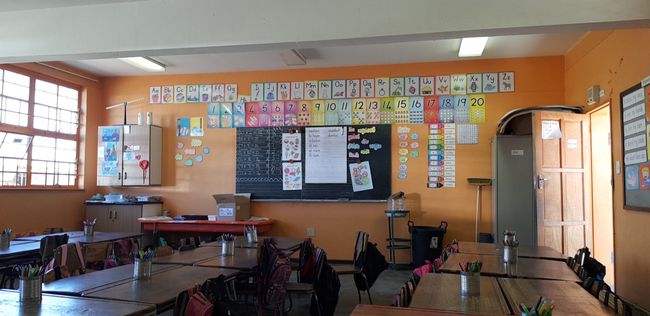Impressions from the lessons
Published: 22.10.2018
Subscribe to Newsletter
As announced in my larger report, I would like to go into more detail about the lessons themselves, as I perceived them. Because in the first entry about everyday school life, I mainly wrote about our projects and had to compress everything because so much has happened, the lessons unfortunately came up short, so now a bit more detail. So far, I have only been in the first four classes of the Elim and can therefore only describe the experiences I have had there or that have been reported to me. All in all, you can say that there are some differences here compared to Germany, which you can well imagine at a distance of about 4,000 km. In Germany, if someone complains about classes being too large, they really get their money's worth here: around 45 students sit in a classroom. And as if the number alone were not already a hurdle, many children do not speak English or Afrikaans properly before they come to school. Only very few attend a kindergarten, so most children only speak their native language and have never really concentrated on one thing when they start school. I think you can imagine that all these circumstances lead to more or less chaos in the classroom, and so the teachers often have no choice but to deal very authoritarian with the children. Yes, the children are often still being beaten by the teachers here, but this depends on the teacher and, what surprised me the most, it hardly affects the bond between teacher and student. Rarely will you see in Germany that five children run off because they see their "teacher" on the schoolyard and want to hug him/her. And so I have the feeling that in addition to a lot of shouting to get the horde of children to calm down, there are also often many loving gestures exchanged. The lessons themselves mainly consist of the teacher writing something on the blackboard and the children having to copy it exactly, sometimes after having spoken the written words five times to the teacher. My impression is that the children simply copy the signs on the blackboard without really understanding what they are learning. It is obvious that there is no time left to deal with individual problems with over 40 children, and so most teachers are happy when we go from table to table and explain it again to individual children. One of the teachers told me that she has 43 children in her class, 15 of whom cannot write and read properly and should actually repeat the first grade. However, since there are limited school places, she is only allowed to keep five of them. As a result, ten children are promoted, cannot read and do math properly, and already in the second grade they no longer keep up. A gap that is almost impossible to close.
Another thing that I would like to mention briefly here is something that fascinates me a lot. The teachers are super nice to each other and to us, they make jokes, but as soon as you enter the classroom, this picture changes radically, the smile disappears and discipline is conveyed. And so it happens that the children who live with us said at the beginning of the year: "don't smile, never, otherwise you won't be respected". I have also had situations when I was alone taking care of a class, where a child came up to me, handed me the stick and said, "you have to hit him/her now, otherwise he/she won't stop". What bothers me the most about this? Most children do their best, of course not always, I have also had a group of five children who fought and bit each other, but most of them try. And when the children come, call "teacher" and hug you, but you are not allowed to smile or hug back, that hurts, it makes you sad.
I would still like to share so much, like how the children share their food without complaining if someone has nothing, how overwhelmed I was with 40 children, how gender roles are supported, or how beautiful it sounds when 1500 students sing the national anthem, the school hymn, or any (mostly Christian-inspired) song together. But I think that can also be picked up elsewhere.
Subscribe to Newsletter
Answer


